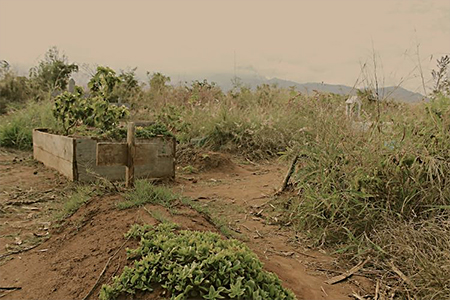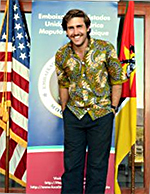Losing a Piece of the Past – A Peace Corps Blog by Thomas O. Isom
Peace Corps writers bring their communities to life. From their unique perspective, they allow us to share a moment in the lives of people we would never otherwise know or understand. Through the years, from letters written on tissue thin airmail papers, to film sent away to be developed, to journals that became books, to videos, Volunteers have sought to bring their world home.
Today, blogs are the media of choice for Volunteers. The blogs are unofficial and Volunteers must adhere to guidelines established by Peace Corps. But the stories still say “Look what I see,” “Let me share what I have learned,” “Know these people as I do.” One such special blog is this written by Thomas O. Isom, Volunteer serving now in Mozambique. Peace Corps has published it on its Passport Blog on the official Peace Corps web page. Here is the link: http://passport.peacecorps.gov/2015/09/25/losing-a-piece-of-the-past/ It is also reprinted here. Read it.
*

Losing a Piece of the Past
by Thomas O. Isom (Mozambique 2014–.)
•
That sound. As the cry becomes more pronounced, it progresses from a murmur to wail. The sound registers in my head: “I’ve heard this before.” This is the sound that occasionally echoes outside the hospital and lingers in the hearts of people close by. It’s the sound that is synonymous with death. However that night was different. The murmur of one turned into the cry of the community.
Looking out my window, I saw my neighbor collapse to her knees as tears uncontrollably fell from her face. Her body throbbed as her sobbing took control. This loss is different.
Racking my brain for the difference, I reflected on previous loss in the community. Mothers losing their child, losing their baby, losing the one with so much life ahead of them. There was lament. There were tears. There was community support, but there was not this hopeless loss of everything.
In the morning, I went to check in on my neighbors. Approaching the house, I caught a glimpse of how the loss still waged on. Puffy-eyed, sluggish, and disconnected, she was monotonously doing the morning cleaning; the weight of the death carried on.
“Laura. Good morning. How are you doing today?” I managed as I approached the woman ready to fall apart again.
“I’m sad.” She managed to choke out.
Before getting ready to go over to her house I reflected on the image of the night before; however, I was not ready for this statement. Not once have I heard someone in Mozambique say that they are sad, just being okay gives people enough concern.
I approached the next few lines with caution.
“Oh no. I’m so sorry. Is there anything I can do?”
Keeping her eyes fixed on the ground she whispered, “No Thomas no. There’s nothing anyone can do.”
Not knowing where to go with the conversation, I asked the question I feared the answer to, “What happened?”
Taking a deep sigh she managed to whisper such a simple but powerful statement. “He died.”
As she slowly squeezed it out she lifted her head to look at me. Eyes red and tears streaming down her weathered face, she couldn’t contain herself any longer. The scene from the previous night made its second appearance.
After a long embrace, we took a seat. Through silence, tears, and periodic talking, the story came out. The man, the oldest man in the community, died at the age of 106.
Not realizing the impact of the elderly in the community, I took a mental step back. A 106-year-old man has this much effect on a community? What did he do? Isn’t it pleasant that he died in his sleep? He lived a full life and was ready to die, right?
Little did I know how engrained my Western view of death was. Traditionally in the States, the loss of a child is heartbreaking because the missed opportunity of the life before him or her, and an older person dying in their sleep is peaceful and eliminates any suffering that they may have had. We focus on the future. Death is different here.
People here celebrate the past; history is what defines them as a people, and they rejoice knowing their mutual history. In their mind, a child had little to no history on the Earth; therefore they unfortunately did not have a chance to contribute to the future of their people. On the other hand someone that had lived many years has experiences that go beyond the minds of much of the community. They hold secrets, legends, and insight into the past that go beyond the masses. In a community where oral history dominates, this man was the gatekeeper.
He told stories of Mozambique under colonial rule, the War for Independence, the Mozambican Civil War and how this community survived through everything. This man held more knowledge about my community than any history book, and now it is gone.
My neighbor, Laura, was beside herself because someone died, yes. But more than that, she lost a part of her when this man passed. She lost a bit of something that defined her. She lost a bit of her community. She lost a bit of her past.
Moments like these require proper reflection. Moments like these humble you with the little time that you have experienced on the earth. Moments like these make you want to go out and hear people’s stories. Everyone has something unique to offer, and it’s about time we go out there and discover the past that has been around us just waiting in the memories of our neighbors. It’s time to go out and create a history for the future.
 •
•
A native of Richmond, Virginia and recent grad of Hampden-Sydney College, Thomas spends him time now in Mozambique. After school hours, he enjoys learning how to dance, making music videos, and discovering untouched areas of his community. For the serious and hysterical adventures that he gets himself into, check out his blog here. https://thomasoisom.wordpress.com
No comments yet.
Add your comment